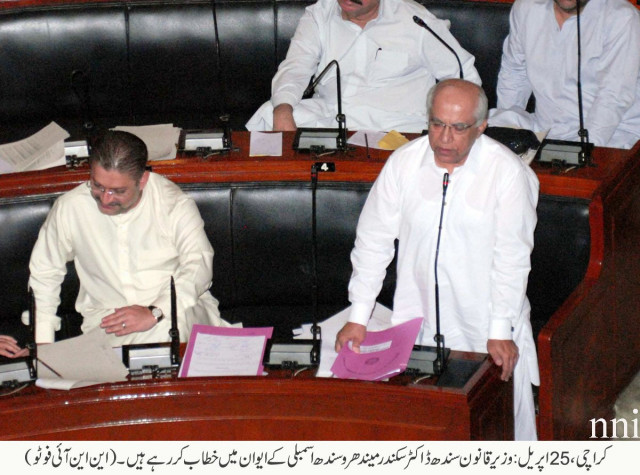MPAs argue over amendments, pass two bills
This was the first session attended by the MQM as part of the treasury bench.

Sindh Law Minister Sikander Mandhro addresses the assembly during Friday's session. PHOTO: NNI
The consideration of government bill No 11 got the members of the Sindh Assembly all riled up. The bill was about honouring the men and women of Sindh’s law enforcement agencies who lost their lives while fighting terrorism, and providing their families with financial compensation.
As the MPAs discussed the bill in the House, the Muttahida Qaumi Movement (MQM) gave parliamentary minister, Sikandar Mandhro, a tough time. This was the first session held after the MQM joined the provinical government earlier this week.
While they agreed that it was a good thing to do. They had some issues which Mandhro had to address.
The first objection raised by the legislators was about why the bill did not include regular citizens as they often fell victim to acts of terrorism as well. The deputy speaker suggested that this could a separate bill and if the House wanted, she could get a copy of a similar bill that was passed in Balochistan during the previous government.
Dr Sagheer Ahmed said that similar bills and compensation should be brought forward for lady health workers, polio workers as those individuals also put their lives in danger trying to give the future generations a healthy future.
Opposition member Irfanullah Marwat said that compensation should also be made for bystanders who lost their lives in attacks where policemen were targeted. He gave the example of the four men who had died in Thursday’s attack on Inspector Shafiq Tanoli.
After this was done, an MQM legislator took objection to the definition of law enforcement agencies. On paper these include Sindh Police, the Rangers, Sindh Prison and intelligence agencies. The lawmaker insisted that the minister should amend the bill to add the word police after Sindh Prison in brackets so as to not confuse the reader. This amendment confused some members who did not understand why this was necessary. Mandhro insisted that they had used the word deployed in the sentence and that implied that they were referring to the policemen who work at Sindh Prisons. The legislator who had raised the objection was not satisfied and continued to argue. Sindh Information Minister insisted that the lawmaker was suggesting a change of government terminology and that could not be done.
Mandhro, in the end, gave in and said that he did not have any objection to doing what the legislator had suggested. The bill was passed after the House decided to correct some grammatical errors in clauses and preamble.
An amendment
A motion to amend the Sindh Criminal Prosecution Services was also moved by Mandhro. The minister said they wanted to amend sections 99 and 100 of the rules of procedure. These amendments, he said, will help the prosecution get their work done easily.
Clause 2 of the amendment was opposed by MQM’s Sardar Ahmed on the grounds that it was ridiculous. He said that the prosecutor-general holding office during the tenure of the government was a practice from the British Raj. “This was only done in the times of the King and Queen,” he said. “This is not used anywhere now. Such things should not exist anymore.”
Mandhro explained that when they make laws, this gives the government certain powers. “It is the government’s responsibility to appoint the right person to the right post,” he said. “If I hire someone today, and if he isn’t doing a good job, then the person or authority who appointed him should answer. This affects the performance of the government and this is why we are making this amendment. People were misusing this.”
To this Ahmed responded by saying, “Well, nobody is appointed on the pleasure of the government,” he said. “There are rules of the public service commission that need to be followed. Even if the person is being asked to leave, they need to be sent show-cause notices.” After a debate, the bill was passed.
Published in The Express Tribune, April 26th, 2014.



















COMMENTS
Comments are moderated and generally will be posted if they are on-topic and not abusive.
For more information, please see our Comments FAQ